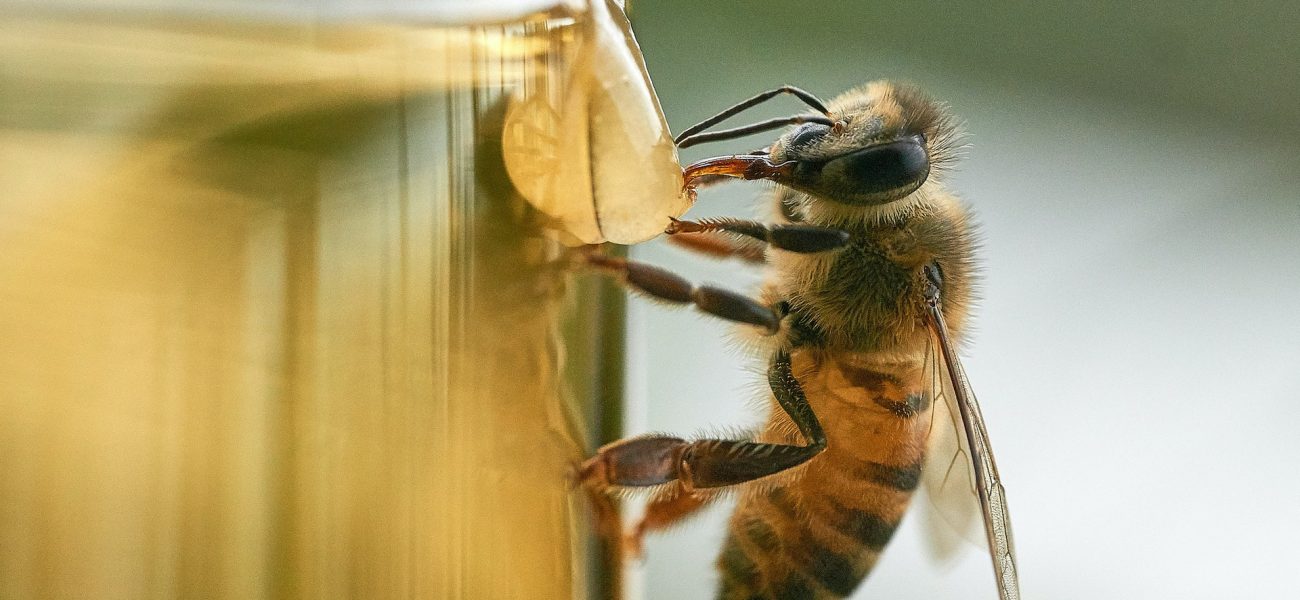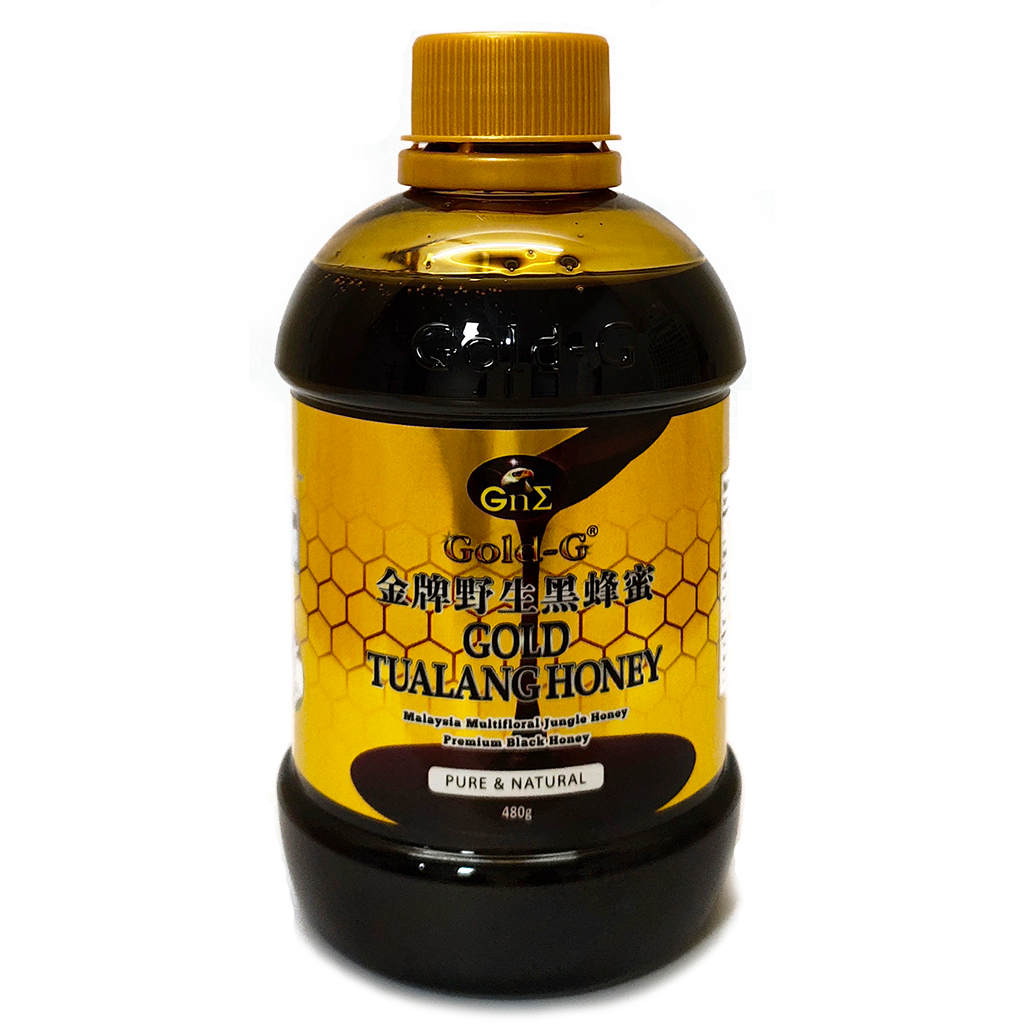Honey is not only food or a natural sweetener, it is also a traditional remedy that may improve health. Let’s see what are the benefits of consuming honey.
1. Effects of honey on sleep
2. Effects of honey on cough
3. Effects of honey on wound healing
4. Effects of honey on bone health
5. Effects of honey on acne
6. Effects of honey on gastrointestinal health
Effects of honey on sleep
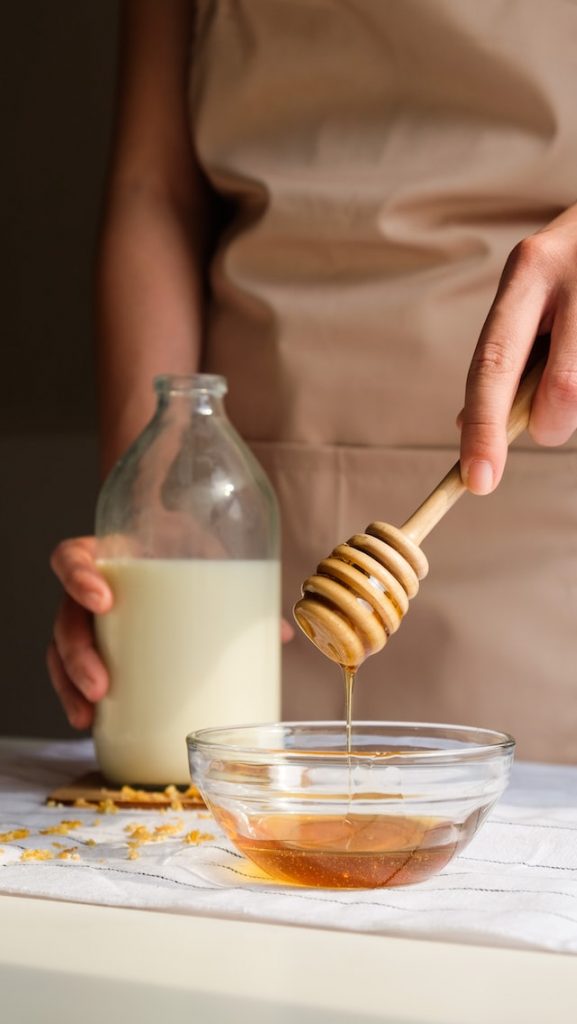
Honey is a traditional remedy to improve sleep, and a cup of warm milk with honey before bedtime is the best!
There is a study found that drinking a mixture of milk and honey twice daily for 3 days improved overall sleep quality in patients with the acute coronary syndrome. Besides, honey is shown to effectively improve sleep quality and reduced nighttime coughing in children with respiratory infections when they are given about half a tablespoon (10g) of honey 30 minutes before bed.
If you are having a hard time falling asleep at night, try to consume a cup of warm milk with a spoonful of honey!
Effects of honey on cough
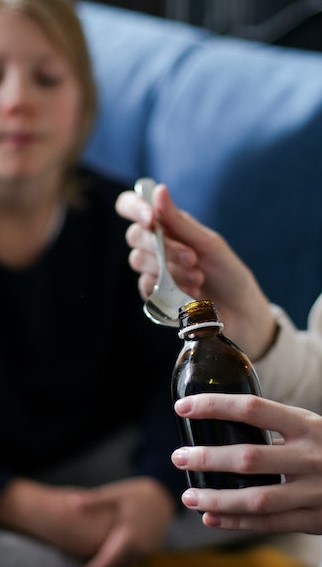
Honey is a well-known remedy for cough and respiratory ailments, and the World Health Organization (WHO) also endorsed the use of honey as a demulcent in the symptomatic relief of a cough and sore throat.
There are many studies confirmed that honey has some therapeutic properties in the treatment of cough. And there is study suggested that honey is as effective as cough medicine (dextromethorphan) in decreasing acute cough in children. Besides, there is study concluded honey can be recommended as a single dose of 2.5 mL (about half teaspoon) before bedtime for children older that 1 year of age with cough.
However, honey is still consisted of sugars, excessive intake of sugars may harm the body health, therefore, it is suggetested to consume honey in moderation (eg. not more than 2 tablespoon per day).
Effects of honey on wound healing
Honey is an efficient and cost-effective wound dressing that is traditionally used to treat burns, infected and non-healing wounds, and ulcers. Generally, studies have shown that topical honey possesses antimicrobial properties, provides a moist healing environment, rapidly clears infection, deodorizes, and reduces inflammation, edema, and exudation.
In minor wounds such as minor burns, cuts, and scratches, it is recommended to rinse with tap water immediately to reduce the temperature (burn) and clean the wound. Afterward, honey can be applied directly onto the burn wound or soaked in gauze before application, and then, an occlusive dressing should be applied to prevent honey from oozing out. Precaution, it is necessary to replace the dressing when the blister fluid or wound exudate diluted the honey dressing.
For severe wounds, it’s important to check with a doctor before using honey on the wound, because the amount of honey and the way the dressing is applied can impact how effective the wound-healing will be.
Effects of honey on bone health
Honey is not only containing glucose and fructose, but it also contains enzymes, amino acids, proteins, flavonoids, phenolic acids, organic acids, vitamins, and minerals in lower quantities. Among these nutrients, flavonoids and phenolic acids contributed to the antioxidant and anti-inflammation properties of honey, and are found to be beneficial for bone health. There are several research studies showed that honey can protect the bone via its antioxidant and anti-inflammatory properties, primarily through its polyphenol content that acts upon several signaling pathways, leading to bone anabolic and antiresorptive effects.
However, the evidence reported so far indicates a skeletal-beneficial effect of honey in animal models of osteoporosis, and the number of studies on humans is limited. Hence, it is advised to consult a doctor or professional before applying honey for osteoporosis prevention.
Effects of honey on acne
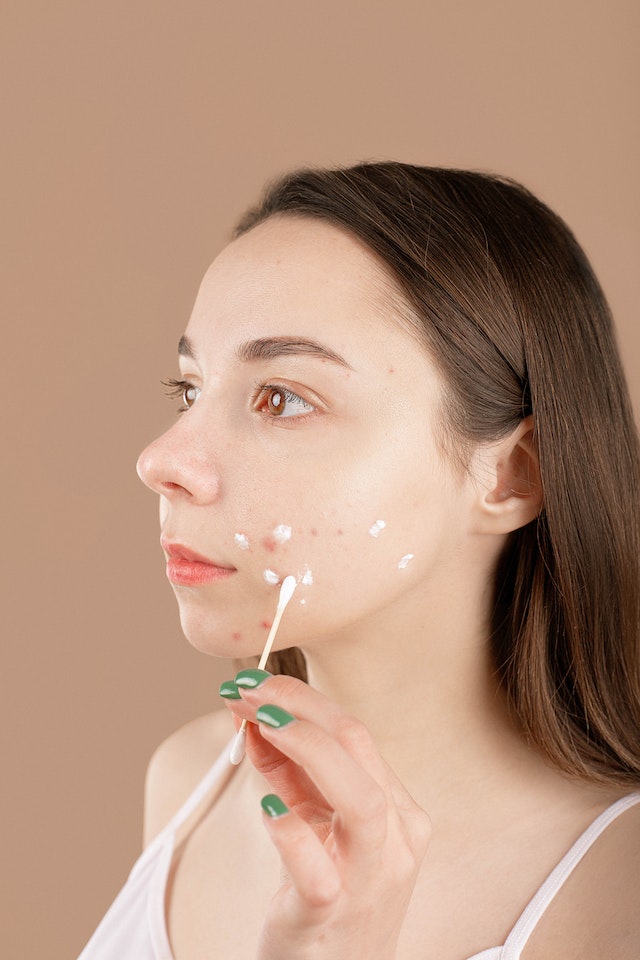
In traditional medicine, honey has been recognized for its skin-healing properties. The skin healing ability of honey has been attributed to its antimicrobial properties, and its ability to modulate the skin’s immune system and promote tissue repair.
There are studies that have revealed that honey can inhibit the growth of Propionibacterium acnes which is a cause of acne. Besides the anti-microbial properties, honey also has anti-inflammatory properties which may help to soothe inflamed acne.
Want to give it a try?
Apply a drop or two on the acne skin through the night and wash it off the next morning.
Effects of honey on gastrointestinal health
Honey has a long history of use for the treatment of digestive ailments. Current research suggests that certain kinds of honey can reduce the presence of infection-causing bacteria in the gut and possess a gastro-protective effect, while simultaneously stimulating the growth of potentially beneficial species, such as Lactobacillus and Bifidobacteria.
A study suggested that honey possesses antibacterial activity against Helicobacter pylori, and may benefit in the treatment of patients with gastritis or duodenal ulcer caused by H. pylori infection. Besides, the oligosaccharides and polysaccharides in honey are likely to resist degradation by host enzymes and are capable of reaching the lower gut to exert prebiotic effects and maintain gut health.
However, there are limited published studies and human response data in this research area. Therefore, do consume honey for maintaining gut health, and do not use honey for therapeutic purposes without a doctor or professional advice.
Gold-G® Gold Tualang Honey
Gold-G® Gold Tualang Honey:
Gold-G® Gold Tualang Honey is a raw and natural honey produced by the Asian Rock Bee, Apis dorsata. It is 100% pure and undergoes minimal processing, with only straining to remove larger particles such as bees, leaves, and honeycomb flakes. It is then directly bottled in a GMP certified factory, allowing it to retain its natural friendly bacteria, propolis, pollen grains, phytonutrients, phenolic acids, and flavonoids. In addition to its natural taste and aroma, it offers higher nutritional value and stronger therapeutic effects compared to processed honey!
Click the link below for direct purchase.
References:
- Fakhr-Movahedi A, Mirmohammadkhani M, Ramezani H. Effect of milk-honey mixture on the sleep quality of coronary patients: A clinical trial study. Clin Nutr ESPEN. 2018;28:132-135. doi:10.1016/j.clnesp.2018.08.015
- Avner, Herman & Rozen, Josef & Kristal, Haim & Laks, Yoseph & Berkovitch, Matitiahu & Uziel, Yosef & Kozer, Eran & Pomeranz, Avishalom & Efrat, Haim. (2012). Effect of Honey on Nocturnal Cough and Sleep Quality: A Double-blind, Randomized, Placebo-Controlled Study. Pediatrics. 130. 465-71. 10.1542/peds.2011-3075.
- Toorani, Mohamed. (2019). The therapeutic role of honey for treating acute cough in the pediatric population. A systematic review.. 8. 80205. 10.7363/080205.
- Bennett, Eric MD; Daly, Sarah DO, FAAFP. Is honey better than dextromethorphan at decreasing acute cough in children?. Evidence-Based Practice: March 2021 – Volume 24 – Issue 3 – p 40-41 doi: 10.1097/EBP.0000000000000453
- Goldman RD. Honey for treatment of cough in children. Can Fam Physician. 2014;60(12):1107-1110.
- Subrahmanyam M. Topical application of honey for burn wound treatment – an overview. Ann Burns Fire Disasters. 2007;20(3):137-139. https://www.ncbi.nlm.nih.gov/pmc/articles/PMC3188068/
- Nall R., Whitworth G., (2019). How, When, and Why Honey Is Used for Wound Care. Available from: https://www.healthline.com/health/honey-on-wounds#application
- Al-Waili, Noori & Salom, Khelod & Al-Ghamdi, Ahmad. (2011). Honey for Wound Healing, Ulcers, and Burns; Data Supporting Its Use in Clinical Practice. TheScientificWorldJournal. 11. 766-87. 10.1100/tsw.2011.78.
- Kamaruzzaman MA, Chin KY, Mohd Ramli ES. A Review of Potential Beneficial Effects of Honey on Bone Health. Evid Based Complement Alternat Med. 2019;2019:8543618. Published 2019 Sep 19. doi:10.1155/2019/8543618
- McLoone P, Oluwadun A, Warnock M, Fyfe L. Honey: A Therapeutic Agent for Disorders of the Skin. Cent Asian J Glob Health. 2016;5(1):241. Published 2016 Aug 4. doi:10.5195/cajgh.2016.241
- Schell KR, Fernandes KE, Shanahan E, et al. The Potential of Honey as a Prebiotic Food to Re-engineer the Gut Microbiome Toward a Healthy State. Front Nutr. 2022;9:957932. Published 2022 Jul 28. doi:10.3389/fnut.2022.957932 https://www.ncbi.nlm.nih.gov/pmc/articles/PMC9367972/
- Nzeako BC, Al-Namaani F. The antibacterial activity of honey on helicobacter pylori. Sultan Qaboos Univ Med J. 2006;6(2):71-76.
- Mohan, Anand & Quek, Siew Young & Gutierrez-Maddox, Noemi & Gao, Yihuai & Shu, Quan. (2017). Effect of honey in improving the gut microbial balance. Food Quality and Safety. 1. 10.1093/fqsafe/fyx015.
This website does not provide medical advice. The content of this website, such as graphics, images, text and all other materials, is provided for reference and educational purposes only. The content is not meant to be complete or exhaustive or to apply to any specific individual’s medical condition. Always seek the advice of your doctor or other qualified health provider regarding a medical condition.

